Author: Seedly.eth
Changpeng Zhao (CZ), the founder of Binance, the world's largest cryptocurrency exchange, pleaded guilty in late 2023 to violating the US Bank Secrecy Act and was sentenced to four months in prison for failing to establish an effective anti-money laundering program. After his release in 2024, the wealthy Chinese businessman experienced a dramatic turn of events just one year later: a pardon from US President Trump granted him complete freedom.
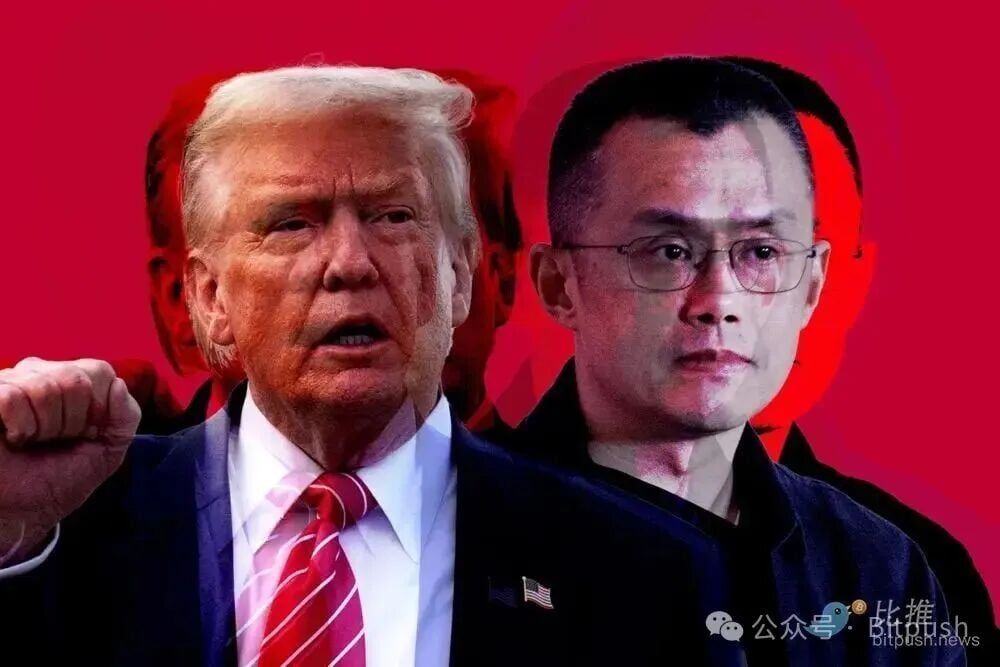
This amnesty order is a "shoe dropping" for many observers; but its signing may mean that a more complicated aftermath has just begun.
The Trump administration declared that the “war on cryptocurrencies is over” and described the prosecution of CZ by the previous Biden administration as a political witch hunt.
At the same time, behind this incident also emerged the complex network of interests of the Trump family deeply involved in the encryption industry - on the one hand, Binance led by CZ was once frustrated in the United States, and on the other hand, Trump and his children built a huge empire by making a massive foray into the field of cryptocurrency.
All of this is intertwined into a shocking reality drama between Washington and Wall Street today: money, power, digital currency, and the trading of interests at the core of America's highest power.
CZ Convicted: From Investigation and Settlement to Four-Month Prison Sentence
CZ was once one of the most legendary figures in the crypto world, but his fate took a sharp turn for the worse under the iron fist of US regulation.
The US Department of Justice has been investigating Binance for years for alleged anti-money laundering and sanctions violations, accusing it of allowing its platform to be used for suspicious transactions, including transfers involving the terrorist organization Hamas. Under intense legal pressure, CZ reached a plea agreement with the DOJ on November 21, 2023, admitting to violating the US Bank Secrecy Act (BSA) by failing to establish an effective anti-money laundering compliance program at Binance.
As part of the agreement, Binance also admitted to the violations, and both parties agreed to pay a total penalty of over $4 billion to settle the case—approximately $4.3 billion from Binance and $50 million from CZ personally. This size of the penalty makes it one of the largest corporate settlements in U.S. history.
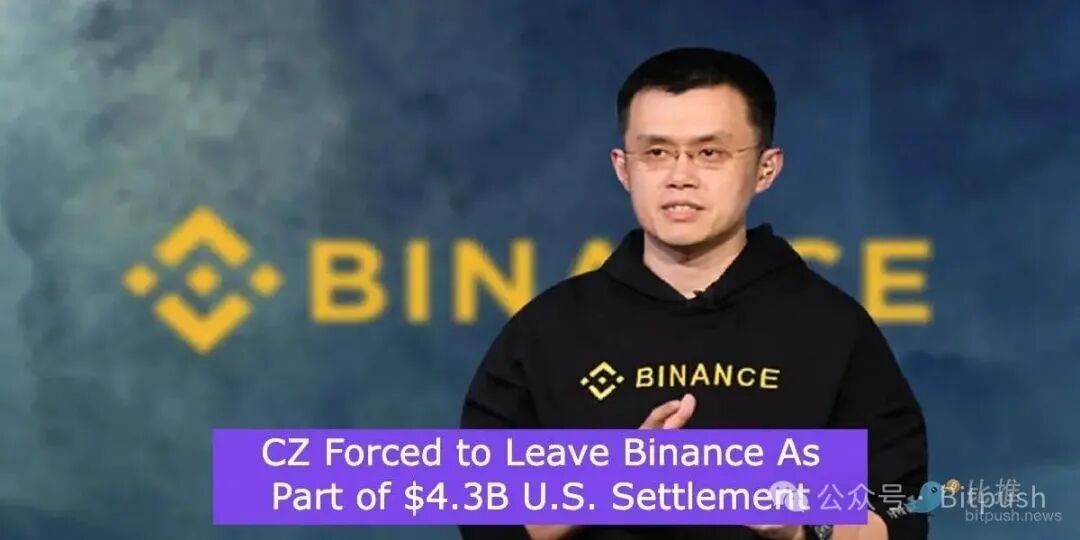
The settlement agreement also imposed severe restrictions on Binance and CZ himself: CZ announced on the spot his resignation as CEO of Binance, and was replaced by Richard Teng, the former head of the Asia-Pacific region. He also agreed to accept a lifetime industry ban, and was permanently prohibited from participating in the management or operation of Binance's global business, especially from holding any executive position in Binance US.
Binance will be subject to three years of independent compliance monitoring to ensure its operations comply with legal requirements. Notably, CZ became the first person in US history to be sentenced to prison for a single BSA charge. At his sentencing hearing on April 30, 2024, a federal judge in Seattle ultimately sentenced CZ to four months in prison.
This sentence may seem short, but it is symbolic - it shows the regulatory authorities' determination to bring crypto giants to justice, and it also caused panic in the global crypto industry.
While serving his sentence, CZ was held in a U.S. federal prison. He was released in September 2024, ending his four-month prison sentence.
CZ no longer officially held any position at Binance, which was also banned from operating in the United States due to its guilty plea and regulatory issues. The once-powerful crypto tycoon had suddenly fallen from grace, his personal reputation and business empire suffering severe damage.
CZ after being released from prison: silence or undercurrent?
After being released from prison, CZ initially chose to keep a low profile and stay out of the public eye.
But beneath his apparent silence, social media and industry rumors suggest he hasn't completely withdrawn from the cryptocurrency scene. In early 2025, rumors began to surface about a potential Trump administration pardon for CZ, spreading across social media platforms like Twitter (now known as X Platform).
In response to this, CZ himself actively responded to media reports and participated in public discussions, demonstrating that his influence has not completely faded due to his imprisonment.
In March 2025, the Wall Street Journal suddenly broke the news: representatives of the Trump family had been in close talks with Binance since 2024, discussing the Trump family's acquisition of a stake in Binance's US branch. The report also revealed that CZ was seeking a presidential pardon. This report shocked the industry and once again propelled CZ into the spotlight.
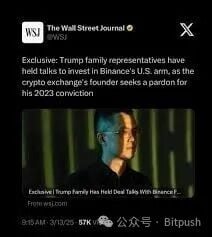
That same day, CZ quickly refuted the report on the X platform: "I'm sorry to disappoint everyone. The Wall Street Journal report got the facts wrong. The fact is: I have not discussed acquiring Binance US with... anyone." However, CZ then bluntly stated, "No felon would mind a pardon, especially since I'm the only person in American history to have been imprisoned for a single BSA charge." This statement was seen as an implicit admission that he did have a desire for a pardon. CZ further implied that the report was politically motivated, saying it felt like an "attack on President Trump and cryptocurrency" and that "the Biden administration's legacy of the war on cryptocurrency is still operating."
By early May 2025, CZ began to more openly express his desire to seek amnesty.
On May 7th, during a podcast appearance, CZ confirmed for the first time that he had formally submitted a request for a presidential pardon to the Trump administration. He explained that since mainstream media outlets were covering the matter, "it might as well be a formal request." He revealed that the application was submitted between late March and early April, within two weeks of the publication of the relevant reports.
During this period, careful observers also noticed that CZ quietly removed the words "former @Binance CEO" from his personal profile on the social platform. This move was seen as a hint of his future identity change, and also triggered speculation from the outside world about his "comeback."
In August 2025, US media further revealed CZ's efforts to secure a pardon: On August 13, he hired Ches McDowell, a lobbyist closely associated with Trump's eldest son, Donald Trump Jr., to lobby for a pardon in Washington. This news confirmed speculation that CZ was actively working behind the scenes.
Meanwhile, the crypto community's interest in CZ's fate reached a fever pitch: betting on the decentralized prediction market Polymarket surged, with the probability of success reaching 64% in mid-October. Some crypto insiders even coined memes like "Binance Life," jokingly suggesting that if CZ were freed, he would continue his lifelong journey tied to Binance.
Trump's sudden pardon: White House intervention and political storm
On October 22, 2025, President Trump signed a pardon for CZ at the White House and announced the decision to the public the next day. White House Press Secretary Carolyn Levitt stated in a statement: "The President exercised his constitutional authority to pardon Mr. CZ, who was indicted in the Biden administration's war on cryptocurrency. The Biden administration's war on cryptocurrency is over."
The Trump administration's move officially ended the previous administration's heavy-handed regulation of the crypto industry and vindicated CZ. Trump himself has reportedly been sympathetic to the claims of CZ and others in the industry being "persecuted," with multiple sources close to Trump stating that he believes the case against CZ is "extremely weak and should never rise to the level of felony charges and imprisonment."
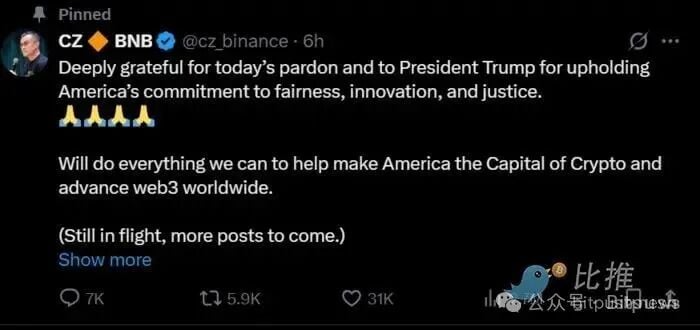
The news of the pardon immediately sparked a fierce political backlash in Washington. Supporters saw it as a demonstration of Trump's commitment to embracing innovation and correcting the mistakes of the previous administration, while critics denounced it as a blatant exchange of favors that severely undermined the rule of law and ethical norms. Opposition Democrats were particularly outraged. Several Democratic senators, including Elizabeth Warren, the ranking member of the Senate Banking Committee, quickly issued a joint statement following the pardon announcement, accusing the Trump administration of condoning crypto crime and weakening financial regulation. Warren, as early as May, when the Trump family's crypto business was involved in a massive transaction with Binance, warned: "A foreign government-backed fund announced it would use Trump's stablecoin for $2 billion, while the Senate is poised to pass the so-called 'GENIUS Act'—stablecoin legislation that would make it easier for the president and his family to enrich themselves. This is corrupt and no senator should support it." In her view, Trump's pardon of CZ implies a massive transfer of interests and conflicts of interest.
The Republican camp generally welcomed this move, believing that the handling of CZ during the Biden era was a manifestation of excessive law enforcement.
Trump administration officials and supporters emphasized that CZ's crimes typically elude prison sentences for other financial executives, arguing that the Biden administration was "selectively enforcing the law" out of political hostility toward the crypto industry, and that Trump was simply addressing this injustice. Trump's new Treasury Secretary even stated in an interview, "The war on crypto is over, and the United States is committed to becoming the global crypto capital." The market reacted swiftly: Following the pardon announcement, the price of Binance's BNB token surged, rising from 1,083 USDT to 1,160 USDT in just a few hours, a 6.7% increase.
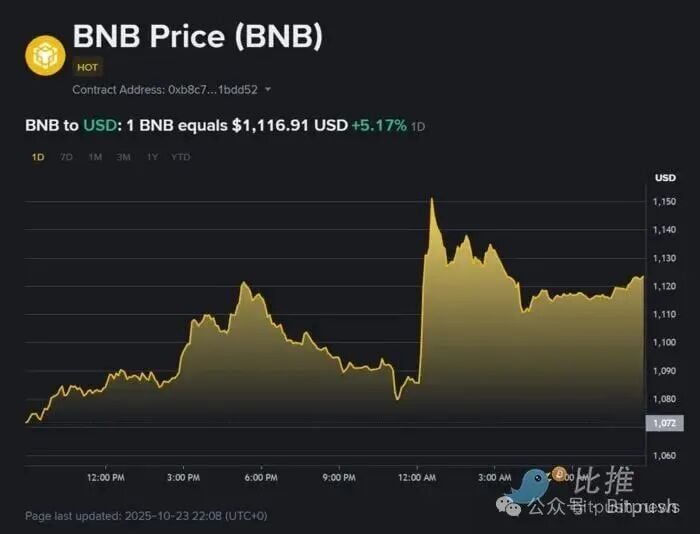
It can be said that this amnesty has caused a storm in the political circles and public opinion field, and also caused ripples in the capital market.
Legally, a presidential pardon means CZ will be exonerated of his federal convictions, potentially removing any penalties associated with them. Legal experts point out that the president holds the supreme power of pardon, granted by the US Constitution, to pardon convictions and sentences for federal crimes. Therefore, Trump's pardon not only shields CZ from further legal consequences but also potentially removes several of the restrictions he agreed to in his plea agreement with the Department of Justice. This theoretically means CZ has a chance to regain control of the crypto empire he built—a fact that excites supporters but deeply worries regulatory hardliners.
The Trump family's crypto landscape: NFTs, tokens, and hidden interest networks
Behind the ups and downs of the CZ case, the rapid rise of Trump and his family in the field of cryptocurrency has become a hidden thread throughout.
Although Trump publicly stated his "lack of interest" in Bitcoin in 2019, he has become an active participant in the crypto community in the years since leaving the White House. In particular, during his 2024 political campaign, Trump reversed his previous stance and publicly embraced digital currency. He not only publicly declared that the US government's Bitcoin holdings would never be sold and designated Bitcoin as a national strategic reserve asset, but also announced on his official website that he would accept cryptocurrency donations to support his campaign. More importantly, the Trump family has begun commercializing the "Trump" brand, deeply embedding it in a series of NFT and crypto token projects, building a crypto-business empire that spans both the political and business worlds.
First, in the NFT field, in December 2022, Trump launched his first personal NFT series - "Trump Digital Trading Cards", each priced at US$99.

These NFT cards use exaggerated images of Trump as a superhero, astronaut, western cowboy, etc. as selling points. They triggered a buying frenzy as soon as they were launched and sold out within 18 hours, with sales reaching US$4.455 million.
Having tasted the sweetness of success, Trump subsequently released four NFT series, selling over 200,000 digital collectible cards in total, generating over $22 million in direct sales revenue. Combined with royalties from secondary market transactions, it's conservatively estimated that his NFT project has netted Trump over $8 million in net profit. Trump successfully transformed his personal IP into a hot seller on the blockchain, not only enriching his finances but also cultivating a vast community of crypto supporters.
However, compared to NFTs, the Trump family's investments in tokens and crypto-finance have had a more far-reaching impact. In September 2024, Trump's two sons, Donald Trump Jr. and Eric Trump, announced their entry into the digital asset market with a high-profile announcement, founding a crypto company called World Liberty Financial (WLF). In October, the company launched its first cryptocurrency, the WLFI token, touting its backing from the Trump family and granting holders "shareholder-like" rights to participate in company decision-making. Despite a lukewarm initial response, only $2.7 million worth of WLFI had been sold by the end of October 2024.
But fortunes changed: after Trump's victory in the presidential election in November 2024, demand for WLFI skyrocketed. Riding the wave of Trump's victory, WLF attracted several significant financing rounds and token subscriptions in early 2025. Data shows that WLF has completed eight rounds of private financing, raising at least $590 million. Over-the-counter trading of WLFI tokens, estimated at a fully diluted market capitalization of approximately $123 billion, has been estimated.
A key reason for WLF's exorbitant valuation is its close connection to the White House and the cryptocurrency world: President Trump's status as president provides the family-owned company with unparalleled policy endorsement. According to WLF's company disclosures and media investigations, Trump personally holds a 60% stake in WLF through a family trust and receives a 75% share of the company's token sales revenue.
Trump's two sons are directly involved in management and operations, serving as so-called "Web3 Ambassadors," co-managing day-to-day operations alongside several veteran crypto entrepreneurs. Even more astonishing is that WLF has locked in family interests by reserving a massive amount of tokens: the Trump family and its affiliates were directly allocated 22.5 billion WLFI tokens (22.5% of the total supply). In less than a year, The New Yorker estimates that the Trump family has profited approximately $412.5 million from this project. It can be said that the Trump family has effectively transformed the political influence of the "First Family" in the White House into highly sought-after "tier-one capital" in the cryptocurrency world.
In addition to issuing WLFI tokens, WLF also launched a dollar-pegged stablecoin USD1 in March 2025, claiming to be 100% backed by U.S. Treasury bonds and cash assets.
Just over a month after Trump's return to the White House, the stablecoin was featured in a major international transaction: MGX, the sovereign investment company owned by Abu Dhabi National Security Advisor Tanoun bin Zayed, announced it would use $2 billion worth of USD1 to acquire a stake in the Binance exchange. WLF co-founder Zach Witkov excitedly announced the news at the Dubai Crypto Conference, stating that "USD1 has been selected as the official stablecoin for MGX's $2 billion investment in Binance."
It is worth noting that Zuck is the son of Steve Witkoff, Trump's Middle East envoy and old friend. Also present on stage with Zuck were Trump's second son, Eric Trump, and Asian crypto tycoon and Tron founder Justin Sun.

The exposure of the MGX transaction has triggered strong doubts in the US political arena: on the one hand, the UAE sovereign fund with foreign government background injected huge amounts of money into Binance, which was fined for money laundering, through the stablecoin issued by the Trump family business; on the other hand, the Trump administration almost simultaneously approved the export of cutting-edge chip equipment worth hundreds of millions of dollars to the company controlled by Tanun, despite national security agencies' concerns that these chips might flow into China.
This coincidence has prompted media and watchdog groups to question whether the Trump administration is trading national interests for the interests of the family business. An in-depth investigation by the New York Times claimed that WLF's operations "blur the boundaries between private enterprise and government policy to an extent unprecedented in modern American history." The report revealed that WLF secretly accepted substantial payments and digital currency exchanges from foreign investors in exchange for access to Trump, and noted that at least one investigation into a related individual was dropped after the payment was made. For example, Chinese crypto tycoon Justin Sun invested at least $75 million in WLF in early 2025 and served as an advisor, following which the U.S. Securities and Exchange Commission (SEC) suspended its investigation into Sun's company. Such interdependencies cast a heavy shadow of conflict of interest over the Trump family's crypto empire.
The Trump family's crypto history also features an intriguing chapter: Trump's personal meme coin. Just before his second inauguration, on January 17, 2025, Trump's team unexpectedly released a meme coin called $TRUMP. The token, issued on the Solana blockchain, had a total supply of 1 billion, 20% of which was sold publicly through an ICO, with the remaining 80% held by companies affiliated with the Trump family. Within a day of its release, $TRUMP's market capitalization skyrocketed to $27 billion, bringing the value of Trump's holdings to over $20 billion.
While this inflated valuation is unsustainable, according to a Financial Times analysis, the project still generated at least $350 million in real money for Trump within a few months. More concerningly, after returning to the White House, Trump repeatedly publicly touted the value of the $TRUMP token and took executive action to inflate its price, directly contributing to a significant increase in his personal net worth. Ethicists have criticized this, claiming that Trump's promotion of a private crypto project and manipulation of policy to favor his own token constitute an unprecedented conflict of interest. However, Trump's spokesperson argued that the president's business assets are managed by his children in trust, thus presenting "no conflict of interest."
Amnesty Mysteries: Vote Trading or Money Transfer?
Taken together, multiple signs suggest that Trump's pardon of CZ wasn't simply motivated by policy, but likely involved a calculation of vote-buying and profiteering. Crypto industry practitioners and investors are seen as a formidable emerging political force in the 2024 election. The Biden administration's stringent regulation of the crypto market has angered many in the cryptocurrency community. Trump, keenly seizing this public sentiment, has positioned himself as the "Crypto President," promising to unleash the power of crypto once in office. Reportedly, the Trump campaign not only received donations from crypto whales and institutions, but also demonstrated goodwill towards the crypto community through high-profile involvement in NFTs and tokens.
In his first month back in the White House, Trump signed several executive orders favorable to the crypto industry, including the "GENIUS Act," which pushes Congress to relax stablecoin regulations. He also invited prominent crypto entrepreneurs like the Winklevoss twins to the White House for an "American Crypto Renaissance" event. Against this backdrop, pardoning CZ undoubtedly further solidified Trump's reputation and support within the crypto community. CZ has a large global following and client base, and Trump's pardon was seen as a friendly signal to the entire crypto community, intended to win over this emerging voter base.
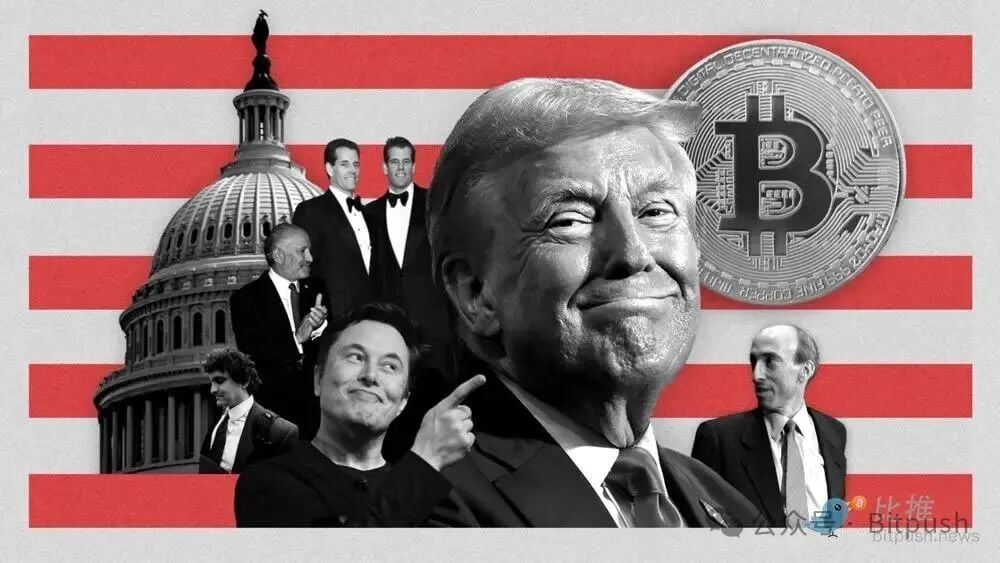
On the other hand, the potential interests of the Trump family's overseas financial backers in the CZ case cannot be ignored. As a global trading platform, Binance has intricate ties with numerous international investors, including the aforementioned Abu Dhabi MGX Fund and overseas investors such as Justin Sun.
These individuals are both key partners in CZ's business empire and frequent guests of Trump's crypto ventures. From MGX's investment in Binance using the Trump stablecoin, to the Trump administration's supply of high-tech chips to the UAE, to Justin Sun's investment in Trump's company in exchange for leniency from the SEC, the entire chain of events clearly reveals a quid pro quo. Trump's pardon of CZ is likely a key link in this transnational game of interests: once CZ is freed, his influence and resources will flow back into the market, indirectly benefiting overseas investors allied with the Trump family. Some speculate that it was the active lobbying and even pressure from these behind-the-scenes stakeholders that ultimately pushed Trump to grant CZ a pardon.
While there's no direct evidence that Trump accepted money in exchange for the pardon, numerous details have heightened public concern. The House Minority Leader has called for an investigation into Trump's decision to pardon CZ, examining whether there was influence-peddling or quid pro quo. Government ethics watchdogs have also called for transparent disclosure of the Trump family's crypto investments and decision-making process to clarify whether the president's actions were influenced by personal business interests. The CZ pardon case has transcended judicial boundaries, becoming a critical examination of the integrity of American politics and the rule of law.
Regulatory impact and the global landscape: Where is the crypto industry headed?
The aftermath of the CZ case and Trump's pardon are profoundly impacting the regulatory landscape and market structure of the crypto industry in the United States and globally. In the United States, Trump's presidency marked a U-turn in federal government policy toward cryptocurrencies: agencies like the Securities and Exchange Commission (SEC) have slowed or even withdrawn lawsuits against crypto companies. For example, the SEC filed a civil lawsuit against Binance in 2023, but dropped the case shortly after Trump took office. Regulatory heads have also been replaced by those with a more open attitude toward crypto, with "safe harbor" and "exemption" becoming key words. This has brought relief to US crypto companies that had previously been cautiously seeking compliance. Forbes reported that by 2025, several crypto exchanges (such as Gemini and Bullish, founded by the Winklevoss twins) had successfully gone public, joining Coinbase. Bitcoin prices hit record highs in 2025, reaching over $126,000 at one point, prompting market participants to exclaim, "The winter is over, and the bull market has resumed." It can be said that the Trump administration's arrival and a series of friendly measures have ushered in a long-awaited recovery for the US crypto industry.
However, this sudden change in the regulatory environment has also triggered complex changes in compliance trends.
On the one hand, deregulation in the United States has unleashed dividends, attracting capital and projects back to the country, leading to a sharp increase in crypto startups, investment, and financing. According to statistics, global crypto mergers and acquisitions exceeded $10 billion in the third quarter of 2025 alone, a 30-fold year-on-year increase. Many traditional Wall Street giants (such as JPMorgan Chase and BlackRock) have capitalized on this opportunity to aggressively enter the crypto market, launching regulated Bitcoin funds and spot ETFs. The easing of regulatory barriers and policy support have encouraged these financial institutions to engage deeply with the crypto sector. This has further spurred industry consolidation, with asset management companies like 21Shares being acquired, and crypto-native companies also embarking on a wave of acquisitions to strengthen their competitive advantage. Overall, under Trump's leadership, the United States is striving to build a "global crypto capital," aiming to bring compliant capital and technology to the country, thereby seizing the initiative in the next wave of innovation.
But on the other hand, the sudden relaxation of US regulations has also triggered concerns about risk out of control and regulatory arbitrage.
Some European and Asian countries have opted for caution, even strengthening regulatory barriers, to mitigate the speculative risks posed by the US policy shift. For example, the EU's MiCA regulatory framework, launched in 2024, remains strictly enforced, with no slackening of capital requirements for stablecoin issuers and exchange operating regulations. In contrast, US law enforcement against major crypto companies has significantly weakened, with even individuals like CZ, convicted of anti-money laundering offenses, being quickly pardoned and returned to prison. Critics have described this as a "step backwards in history." Financial crime experts warn that a softening US stance could foster a sense of complacency in the industry, leading some companies to relax internal compliance practices, believing they could evade sanctions or even overturn convictions through political channels even if they stray from the line. This poses a potential threat to the global anti-money laundering and counter-terrorist financing system. Other jurisdictions may be forced to pursue separate approaches to crypto regulation from the US, making global regulatory coordination more difficult.
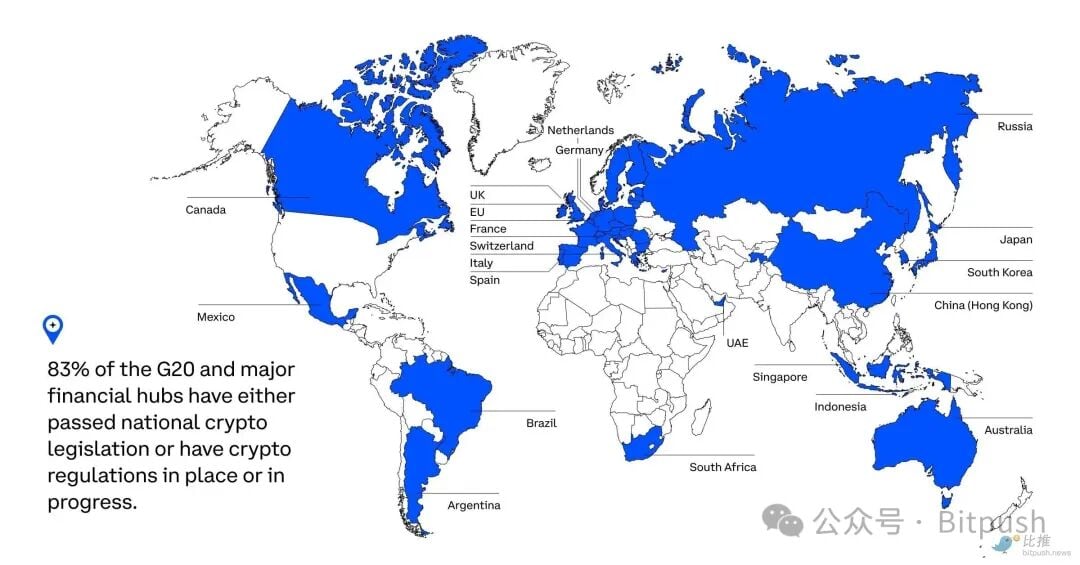
For international platforms like Binance, this shift in US policy is undoubtedly a significant turning point. Although Binance suffered a significant setback and withdrew from the US market in 2023, Trump's pardon and regulatory relaxation may offer a chance for a comeback. Analysts suggest that Binance US, previously paralyzed, may now benefit from investment from the Trump family, potentially offering a "curve-turned rescue." More notably, CZ's personal room for maneuver has significantly expanded. Trump's pardon removes a major legal hurdle if he truly wishes to return to industry leadership. Of course, this will depend on the delicate relationship CZ will have with US regulators. While he may rise rapidly under the Trump administration, he and Binance could still face the risk of liquidation should the regime change. This uncertainty also reflects the hidden dangers of politicized US crypto regulation—the rise and fall of companies are highly correlated with changes in the White House, which is detrimental to industry stability in the long term.
The CZ case and Trump's pardon have also had a ripple effect on the international market. Asian and Middle Eastern investors are actively seizing this opportunity and accelerating their investment in the global crypto landscape. Institutional investors in Abu Dhabi, Singapore, Hong Kong, and other regions, which previously distanced themselves from Binance due to concerns about crossing US red lines, may now be emboldened to collaborate with the company due to Trump's shift in attitude.
Binance itself may also be seeking a new balance between compliance and the gray area: now that the US market is showing signs of life again, Binance will undoubtedly invest resources in rebuilding its compliance image and repairing its relationship with US regulators, while also consolidating its dominant position in non-US markets. As US-funded exchanges like Coinbase and Gemini expand overseas due to favorable policies, if Binance can regain some level of US access, it will undoubtedly solidify its position as a global leader.
Conclusion
CZ's story seems to have come to an end, but the discussion it has sparked is far from over.
After this incident, everyone saw things more clearly. US regulatory logic isn't set in stone; it can be distorted by power struggles and adjusted under industry pressure. The crypto world is no longer an isolated island, completely detached from the fray. It must learn to navigate the cracks in policy and even actively participate in the formulation of rules.
Trump's pardon is more of a fresh start than an end. It has shown the market the enormous influence of politics on the crypto industry and has made regulators around the world realize that this emerging field may require a more flexible strategy than they imagined.
CZ has regained his freedom, but the long-term integration between the crypto world and mainstream society is far from over. The only certainty is that every technological breakthrough and policy adjustment will continue to test the wisdom of all parties involved. Where this road will lead, no one can foresee it in advance.







